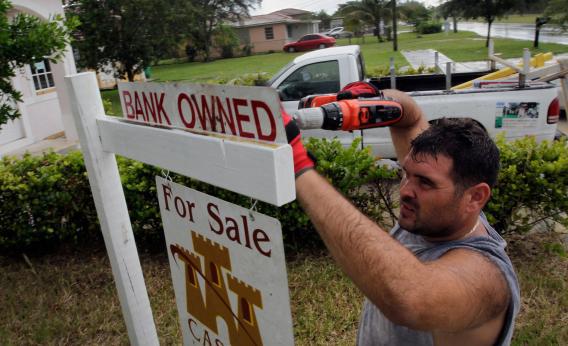LAS VEGAS – In real time, it certainly seemed like the GOP presidential candidates were fumbling around when asked about what you do as president to help fix the overall problem of real estate and foreclosures.” In the transcript, it looks even worse. Behold, the way that the hopefuls talked about foreclosures. For some reason, first tier candidate Rick Perry didn’t get asked the question – enjoy all the verbiage from the niche candidates!
Rick Santorum:
Yeah, I mean, it’s – it’s a situation right now where obviously the market’s in – has been decimated. And so now you’re looking at, how do you repair it? The problem is – in the first place, is that several people up here, the, quote, “businesspeople,” supported the TARP, supported the bailout… I mean, look at what’s going on here. I mean, the – the bottom line is, you all supported it, you all started this ball rolling, where the government injected itself in trying to make – trying to fix the market with the government top-down trying to do it, and managed decline. And what happened was, people who did things that were wrong invested in things, took risks, were bailed out, and the folks who acted responsibly are now getting hurt because their houses have gone down in value. We need to let the market work, and that’s what hasn’t been happening so far.
Do you get the sense he’s thought as deeply about this as he’s thought about whether Dan Savage is too mean? No, me neither.
Michele Bachmann:
Every day I’m out somewhere in the United States of America, and most of the time I’m talking to moms across this country. When you talk about housing, when you talk about foreclosures, you’re talking about women who are at the end of their rope because they’re losing their nest for their children and for their family. And there are women right now all across this country and moms across this country whose husbands, through no fault of their own, are losing their job, and they can’t keep that house. And there are women who are losing that house. I’m a mom. I talk to these moms. I just want to say one thing to moms all across America tonight. This is a real issue. It’s got to be solved. President Obama has failed you on this issue of housing and foreclosures. I will not fail you on this issue. I will turn this country around. We will turn the economy around. We will create jobs. That’s how you hold on to your house. Hold on, moms out there. It’s not too late.
What the hell is she talking about? The closest she gets to a policy is admitting this is a “real issue” that’s “got to be solved.”
Herman Cain:
We need to get government out of the way. It starts with making sure that we can boost this economy and then reform Dodd-Frank and reform a lot of these other regulations that have gotten in the way.
It definitely would solve some of the problem if the economy rebounded, but that’s still a dodge on the foreclosure question.
Mitt Romney:
There’s an effort on the part of people in Washington to think somehow they know better than markets, how to rebalance America’s economy. And the idea of the federal government running around and saying, hey, we’re going to give you some money for trading in your old car, or we’re going to give you a few thousand bucks for buying a new house, or we’re going to keep banks from foreclosing if you can’t make your payments, these kind of actions on the part of government haven’t worked. The right course is to let markets work. And in order to get markets to work and to help people, the best we can do is to get the economy going. And that’s why the fundamental restructuring I’ve described is so essential to help homeowners and people across this country.
This answer makes perfect sense: Romney doesn’t want to intervene in the market and help out people whose mortgages are underwater. That’s the position conservatives have had since the start of the crisis. Fear of the government getting involved, and bailing out the people whom Rick Santelli memorably called “the losers,” actually inspired the Tea Party as much as any big spending Obama plan.
Ron Paul:
So the bailouts came from both parties. Guess who they bailed out? The big corporations of people who were ripping off the people in the derivatives market. And they said, oh, the world’s going to come to an end unless we bail out all the banks. So the banks were involved, and the Federal Reserve was involved. But who got stuck? The middle class got stuck. They got stuck. They lost their jobs, and they lost their houses. If you had to give money out, you should have given it to people who were losing their mortgages, not to the banks.
In actual fact Paul’s policy would be non-intervention, and allowing creative destruction to sort out the problems with the market. But in pure rhetorical terms, he’s the only candidate who expresses any sympathy for the foreclosed, or any interest in how the bailout failed to save them. And he’s basically being written out of the debate stories.
